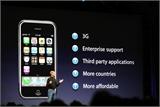Steve Jobs: The Revenge of the Apple Father
The experience of Jobs sounds more like a revenge story. In his speech at the Stanford University graduation ceremony in June this year, he talked about his past failure, which turned out to be the best thing that had ever happened to him after being fired from Apple.
In Jobs' view, the process of becoming an entrepreneur again after being a success made him feel free, and thus he entered the most creative phase of his life. From a personal perspective, this experience is an indispensable part of Jobs' legend. But it is necessary to remind readers here that it was still a stormy period. It promoted the personal growth of leaders in an extreme way. Such a history of personal struggle is usually not replicable.
However, it reveals the mystery of the ups and downs in the business world on another level. The reason for Jobs' downfall was mainly due to his excessive indulgence in technology, thus neglecting the overall operation of the company, and failing to achieve both; the escalation of his conflict with Sculley was essentially the inevitable result of Apple's transition from its early stage to the rule era.
As the founder of Apple, Jobs, who failed to complete his personal transformation in time, eventually lost in the power struggle. Ten years later, his re-emergence proved the essential elements that a leader should have in the modern corporate system: inexhaustible creativity, good at seizing opportunities to shape an authoritative image.



